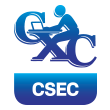The Caribbean Advanced Proficiency Examination (CAPE) is designed to provide certification of the academic, vocational and technical achievement of students in the Caribbean who, having completed a minimum of five years of secondary education, wish to further their studies. The examinations address the skills and knowledge acquired by students under a flexible and articulated system where subjects are organised in 1-Unit or 2-Unit courses with each Unit containing three Modules. Subjects examined under CAPE may be studied concurrently or singly.
The Caribbean Examinations Council offers three types of certification at the CAPE level. The first is the award of a certificate showing each CAPE Unit completed. The second is the CAPE Diploma, awarded to candidates who have satisfactorily completed at least six Units, including Caribbean Studies. The third is the CXC Associate Degree, awarded for the satisfactory completion of a prescribed cluster of eight CAPE Units including Caribbean Studies, Communication Studies and Integrated Mathematics. Integrated Mathematics is not a requirement for the CXC Associate Degree in Mathematics. The complete list of Associate Degrees may be found in the CXC Associate Degree Handbook.
For the CAPE Diploma and the CXC Associate Degree, candidates must complete the cluster of required Units within a maximum period of five years. To be eligible for a CXC Associate Degree, the educational institution presenting the candidates for the award, must select the Associate Degree of choice at the time of registration at the sitting (year) the candidates are expected to qualify for the award. Candidates will not be awarded an Associate Degree for which they were not registered.
The Caribbean society is an integral part of an ever-changing world. The impact of globalisation on most societies encourages this diverse Caribbean region to revisit the education and career opportunities of our current and future citizens. A common denominator is for Caribbean societies to create among its citizens a plethora of quality leadership with the acumen required to make meaningful projections and innovations for further development. Further, learning appropriate problem-solving techniques, inherent to the study of mathematics, is vital for such leaders. Mathematics promotes intellectual development, is utilitarian and applicable to all disciplines. Additionally, its aesthetics and epistemological approaches provide solutions fit for any purpose. Therefore, Mathematics is the essential tool to empower people with the knowledge, competencies and attitudes which are required for academia as well as quality leadership for sustainability in this dynamic world.
The Integrated Mathematics course of study will provide students with the knowledge and skills sets required to model practical situations and provide workable solutions in their respective field of study. These skills include critical and creative thinking, problem solving, logical reasoning, modelling ability, team work, decision making, research techniques, information communication and technological competencies for life-long learning. Such holistic development becomes useful for the transition into industry research and further studies required at tertiary levels. Moreover, the attitude and discipline which accompany the study of Mathematics also nurture desirable character qualities.
This syllabus will contribute to the development of the Ideal Caribbean Person as articulated by the CARICOM Heads of Government in the following areas: “demonstrate multiple literacies, independent and critical thinking and innovative application of science and technology to problem solving. Such a person should also demonstrate a positive work attitude and value and display creative imagination and entrepreneurship”. In keeping with the UNESCO Pillars of Learning, on completion of this course of study, students will learn to do, learn to be and learn to transform oneself and society.
This syllabus aims to:
- improve on the mathematical knowledge, skills and techniques with an emphasis on accuracy;
- empower students with the knowledge, competencies and attitudes which are precursors for academia as well as quality leadership for sustainability in the dynamic world;
- provide students with the proficiencies required to model practical situations and provide workable solutions in their respective fields of work and study;
- develop competencies in critical and creative thinking, problem solving, logical reasoning, modelling, team work, decision making, research techniques and information communication and technology for life-long learning;
- nurture desirable character qualities that include self-confidence, self-esteem, ethics and emotional security;
- make Mathematics interesting, recognisable and relevant to the students locally, regionally and globally.
The skills and abilities that students are expected to develop on completion of this syllabus have been group under three headings:
- Conceptual Knowledge;
- Algorithmic Knowledge; and,
- Reasoning.
Conceptual Knowledge
The examination will test candidates’ ability to recall, select and use appropriate facts, concepts and principles in a variety of contexts.
Algorithmic Knowledge
The examination will test candidates’ ability to manipulate mathematical expressions and procedures using appropriate symbols and language, logical deduction and inferences.
Reasoning
The examination will test candidates’ ability to select appropriate strategy or select, use and evaluate mathematical models and interpret the results of a mathematical solution in terms of a given real-world problem and engage in problem-solving.
Any person with a good grasp of the contents of the syllabus of the Caribbean Secondary Education Certificate (CSEC) General Proficiency course in Mathematics, or equivalent, should be able to undertake the course. However, successful participation in the course will also depend on the possession of good verbal and written communication skills.
The Integrated Mathematics Syllabus comprises three Modules, each requiring at least 50 hours. Students will develop the skills and abilities identified through the study of:
Module 1 – FOUNDATIONS OF MATHEMATICS
Module 2 – STATISTICS
Module 3 – CALCULUS













